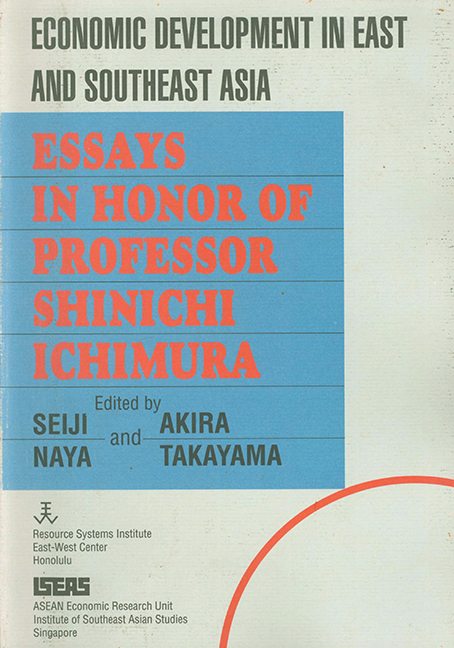Book contents
- Frontmatter
- Preface
- Shinichi Ichimura, 1925-
- CONTENTS
- Introduction
- Contributors to This Volume
- I Structural Change and Economic Development in Developing Asia in the 1990s
- II Explaining the Success of the Four Little Dragons: A Survey
- III Taiwan's Economic Miracle: A Singaporean Perspective
- IV Singapore's Experience of Industrial Restructuring: Lessons for the Other Asian NIEs
- V Korean Industrial Policies for Declining Industries
- VI Vietnam: Recent Economic Developments and the World Economy
- VII Transition from Import Substitution to Export Expansion: The Thai Experience
- VIII Adjustment Problems of a Small Oil-Exporting Country: Did Indonesia Suffer from the Dutch Disease?
- IX A Quarterly Econometric Model of the Hong Kong Economy
- X The Effect ofRicardian Rent Extracting on Macroeconomic Performance
- XI Direct Foreign Investment and the Economic Development of Korea
- XII Japanese Investment in Thailand: Looking Back and Into the Future
- XIII The Effects of Direct Foreign Investment on Taiwan: A Macroeconometric Investigation
- XIV A Reform of the Foward Foreign Exchange Market and Foreign Exchange Rate Determination Policy in Korea, with Foreign Exchange Policy Experiences of Taiwan
- XV Interest Rate and Foreign Exchange Liberalization in Taiwan in the 1980
- XVI Manifold Dilemmas behind External Debt Management
- XVII Agricultural Growth and Food Imports in Developing Countries: A Reexamination
- XVIII The Transformation of Rural Asia and Economic Development Theory and Policy
- XIX The ASEAN Summit and ASEAN Economic Cooperation
- XX The Role of Developing Countries in the New GATT Round
- XXI The Emerging Global Economy and the Role of the Asian NIEs
- Index
XXI - The Emerging Global Economy and the Role of the Asian NIEs
Published online by Cambridge University Press: 21 October 2015
- Frontmatter
- Preface
- Shinichi Ichimura, 1925-
- CONTENTS
- Introduction
- Contributors to This Volume
- I Structural Change and Economic Development in Developing Asia in the 1990s
- II Explaining the Success of the Four Little Dragons: A Survey
- III Taiwan's Economic Miracle: A Singaporean Perspective
- IV Singapore's Experience of Industrial Restructuring: Lessons for the Other Asian NIEs
- V Korean Industrial Policies for Declining Industries
- VI Vietnam: Recent Economic Developments and the World Economy
- VII Transition from Import Substitution to Export Expansion: The Thai Experience
- VIII Adjustment Problems of a Small Oil-Exporting Country: Did Indonesia Suffer from the Dutch Disease?
- IX A Quarterly Econometric Model of the Hong Kong Economy
- X The Effect ofRicardian Rent Extracting on Macroeconomic Performance
- XI Direct Foreign Investment and the Economic Development of Korea
- XII Japanese Investment in Thailand: Looking Back and Into the Future
- XIII The Effects of Direct Foreign Investment on Taiwan: A Macroeconometric Investigation
- XIV A Reform of the Foward Foreign Exchange Market and Foreign Exchange Rate Determination Policy in Korea, with Foreign Exchange Policy Experiences of Taiwan
- XV Interest Rate and Foreign Exchange Liberalization in Taiwan in the 1980
- XVI Manifold Dilemmas behind External Debt Management
- XVII Agricultural Growth and Food Imports in Developing Countries: A Reexamination
- XVIII The Transformation of Rural Asia and Economic Development Theory and Policy
- XIX The ASEAN Summit and ASEAN Economic Cooperation
- XX The Role of Developing Countries in the New GATT Round
- XXI The Emerging Global Economy and the Role of the Asian NIEs
- Index
Summary
Introduction
In the communique adopted at the Toronto Summit in June last year, the Group of Seven (G-7) observed that, in sharp contrast to the 1970s when growth in the major industrial countries was weak and inflation high, the 1980s have seen the longest period of economic growth in post-war history. The G-7 also noted that sustained noninflationary growth has been accompanied by the emergence of large structural imbalances in the major industrial countries, exchange rate volatility, and debt-servicing difficulties in many developing countries. As at previous summits, the G-7 countries at Toronto declared their willingness to cooperate and to institute policies to solve global economic problems. They vowed to strengthen cooperative efforts to reduce spending growth in countries with large external deficits and to keep up the momentum of domestic demand in nations with large external surpluses; introduce structural reforms by removing barriers, unnecessary controls and regulations, and increasing competition; support the Uruguay Round of GATT negotiations for freer trade in manufactures, services, and farm products; adopt a case-by-case approach to debt rescheduling; and take action to protect the environment.
The Toronto communiqué, however, did not include any specific plans to deal with global economic problems. It announced no agreement on ways to settle the contentious issue of agricultural subsidies. Nor did the meeting provide a strong signal for urgent action to the crucial midterm GATT review at the end of 1988 in Montreal. But it did manage to reach a consensus on rescheduling the official debt of the world's poorest countries.
Though it did not come up with bold and imaginative approaches to deal with global economic problems, the Toronto meeting was significant from the perspective of the Asia-Pacific region. It was the first summit at which Japan had sought to play an important and visible role befitting its status as the world's second largest economy and perhaps its greatest financial power. The Prime Minister of Japan, Noboru Takeshita, reminded the leaders of the other six major industrial countries that Japan was the only Asian country at the Summit, and urged that attention be paid to the concerns of the Asian newly industrializing economies (NIEs) of Korea, Taiwan, Hong Kong and Singapore. He also put forth proposals on Third World debt and aid.
- Type
- Chapter
- Information
- Economic Development in East and Southeast AsiaEssays in Honor of Professor Shinichi Ichimura, pp. 319 - 332Publisher: ISEAS–Yusof Ishak InstitutePrint publication year: 1990



